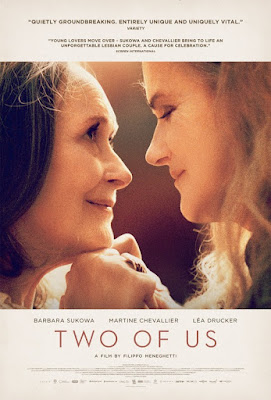Two of Us (2019)
Director: Filippo Meneghetti
Stars: Barbara Sukowa, Martine Chevallier, Léa Drucker
Runtime: 99 minutes
Synopsis: Pensioners Nina and Madeleine have hidden their deep and passionate love for many decades, but their bond is put to the test when they are suddenly unable to move freely between each other's apartments.
Verdict: Nina and Madeleine are elderly neighbors who have loved each other for decades. They have kept their relationship a secret but their dream of buying a house in Rome is obstructed by the fact that Madeleine hasn’t come out to her children yet. They loved their late father, and she knows that such a revelation may come as a shock to them, to the point of jeopardizing the maternal bond they still share. The pressure of having to choose between the love of her life and her offspring eventually led to serious health problems and complications that will test the couple’s love once and for all.
“Two of Us” introduces a conflict that has been explored many times before. Plenty of movies dissect the pressures that come with being open about one’s sexuality, but this film approaches it from a perspective that is rarely adopted: that of a parent hiding their true preference. It’s a concept I was on board with the second it was presented, and I was eager to see where it would ultimately lead, but the narrative quickly derailed into something I wasn’t remotely as interested in. It turned into a forbidden love story that was trying too hard to be a thriller as well, one where the script kept bombarding us with unnecessary rivalries and needless twists instead of adopting a mature path. The initial conflict quickly drowned in a sea of hardships that stripped the French movie from the identity it set for itself early on. The more it went on, the more frustrated I became with what I was watching, and, by the end, I couldn’t help but feel that the script was written by two writers with vastly diverging ideas.
“Two of Us” still contains hints of a good movie and is elevated by very believable chemistry shared by its leads, but it most certainly does not reach the potential it builds up in its opening minutes. I’d frankly recommend checking out “Amour” instead, which is a lot more consistent despite not entirely aligning with the themes that this film bases its narrative on.
FINAL GRADE: 6/10

Comments
Post a Comment